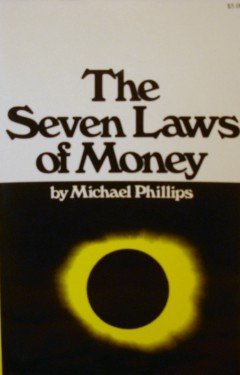The Seven Laws of Money
How to Live With Money
How to Get It, Care for It, and Forget About it.
“These seven simple laws are the secret to a healthy, fearless attitude toward money, liberating its creative potential for everyone. A friendly, upbeat guide to using money instead of being used by it”
–Marsha Sinetar, author of Do What You Love, the Money Will Follow
Michael and Salli wrote this book in response to a growing interest in business and money during the 1970s by friends and friends of friends, many of whom had been social activists in the 1960s and wanted to run their own businesses while staying true to their values.
Yes, Seven Laws can be seen as a book about personal finance, but, more importantly, it is a definitive introduction to three key principles or practices that are critical to success in any right livelihood business:

-
Passion for one’s work
-
Honesty and openness
-
Accurate accounting records and regularly reviewed detailed financial statements
The mechanism for doing this (based on an ancient algorithm) included a point-by-point, detailed explanation of the Seven Laws (See samples below—click on any law title to jump to its “landing page.”).


To see a case example of several of the laws of money in play, check out “New College and the Seven Laws: Money as Dream, Money as Nightmare by Claude Whitmyer.”
“The First Law is the hardest for most people to accept and is the source of most distress.
“The clearest translation of this in terms of personal advice is ‘go ahead and do what you want to do.’ Worry about your ability to do it and your competence to do it but certainly do not worry about the money.
“. . . get started; go forward; get something done.
“Try to separate the issue of the project you’re working on from your own problem of survival.
“If you’re going to predicate the project’s survival on your own need to be comfortable . . . you have already doomed the project.
“Figure out how you’re personally going to survive and then, separately, how important the project is to you. You’re going to have to continue to support yourself anyway, and when you’re working on the project that’s an added burden. But the project per se, the success of the project per se, will be seriously jeopardized if you integrate your own need to make a living with the needs of the project.”
“The rules of money are probably Ben Franklin-type rules, such as never squander it, don’t be a spendthrift, be very careful, you have to account for what you’re doing, you must keep track of it, and you can never ignore what happens to money.
“The high priests of Law Two, are obviously accountants. . .
“What does an accountant do? .
“Just as the goldsmith, or an apprentice of his, knows, on holding up a balance, that by so much it has dipped down, by so much it has tilted up; even so a householder, knowing his income and expenses leads a balanced life, neither extravagant nor miserly, knowing thus that his income will stand in excess of his expenses, but not his expenses in excess of his income.”
Dighajanu Sutta
“He looks at what is coming in, and examines all the details of how monies were expended. He studies the records to see how the money flowed through and where it was stored at any particular time. He uses such things as an income and expense statement or an asset and liability statement. These are simply records of the flow of money kept in accurate detail by general categories.
The rule of money is that you just can’t hand several people checks and say go ahead, write the checks you want on this checking account; you can’t! Someone has to be responsible for knowing what check was written, where it went, and wher the funds were coming from. Those are the rules of money and they are absolute.”
“Money is very much a state of mind. It’s much like the states of consciousness that you see on an acid trip. Maybe it is the animal figure seen in the peyote dream (Mescalito). It is fantasy in itself, purely a dream. People who go after it as though it were real and tangible, say a person who is trying to earn a hundred thousand dollars, orients their life and ends up in such a way as to have been significantly changed simply to reach that goal. They become part of that object and since the object is a dream (a mirage) they become different from what they set out to be.”
[A good example of money as a nightmare] “. . . might be people in jail who are living a nightmare because of their involvement with money. About ninety percent of all crimes are committed because of money . . . and about eighty percent of all people in jail are there because of money-related crimes. Eighty percent of all crimes consist of robbery, burglary, larceny, forgery, and auto theft. A few other things which push the percentage even higher are murders, especially family murders, which have to do with money, and assault and battery crimes in which theft is a motive. Money is a very significant reason for people to go to jail. Maybe one way of stating it is that their aspiration for money and their ability to accumulate it are radically different.”
Drunk on delusion greed and anger
dazed and unaware
you turn money into a dream
a dream that becomes an iron jail
using one pain to get rid of another
you never get rid of pain
unless you learn before it’s too late
you learn to turn to yourself
Shih Te (Pickup)
The Collected Songs of Cold Mountain
p. 291, Translated by Red Pine
“In dynamic terms, money describes a relationship: borrower/lender, or seller/buyer, or parent/child. Looked at over a period of time, money flows in certain channels, like electricity through wires. The wires define the relationship, and the flow is the significant thing to look at. . . . We are used to seeing it in static terms, where we normally expect to see a two-directional flow associated with money.
“When we see someone who gives a friend $25.00 and says ‘keep it.’ We call that a ‘gift’ because it is a one-directional flow, or at least it seems to be, in the context of a short period of time. The Fifth Law of Money suggests that by looking at the gift in a larger or longer term of perspective we will see that it is part of a two-way flow.
“Dick Raymond likes the term ‘alliance’ to describe the giving relationship. I think a lot of people can identify with that term. I feel more comfortable with the words ‘loan’ or ‘investment’ to describe the giving relationship. From a casual perspective, the lender gives the money and the borrower just signs a piece of paper. In a real-life giving situation, the piece of paper (loan note) and its contents are implicit in the situation but are not customarily talked about in our culture.”
[ For an example of the application of Laws 5 and 6, visit Briarpatch Dues & Donations. ]
“Money is either borrowed or lent or possibly invested. It is never given or received without those concepts implicit in it. Some people may say “Oh! I understand that what you are really giving is karma or receiving is Karma and Karma can be good or bad.
“What I interpret this to mean is that the act or supposed act of giving money implies the creation of a ‘relationship.’ It’s a temporary imbalance. Giving money requires some repayment. If it’s not repaid the nightmare elements enter into it.”
[ For an example of the application of Laws 5 and 6, visit Briarpatch Dues & Donations. ]
“When you are asleep and dreaming, that’s a world without money. There may be other places in the universe, there may be other concepts and other states of life in which there’s no money, but the last Law makes it really hard to forget that everything we do when we’re awake is related to money. You can take it away, such as with people in prisoner of war camps; but cigarettes become money. It’s there as long as there are people to interact and they are awake.
“There are the worlds of art, poetry, music, dance, sex, etc. the essentials of human life. The seventh law is like a star that is your guide. You know that you cannot live on the star; it is not physically a part of your life, but rather an aid to orientation. You are not going to reach this star, but in some sense neither are you going to reach your destination without it to guide you.”
The Seven Laws of Money
by Michael Phillips and Sally Rasberry.
Briars Dick Raymond, Jug ‘n’ Candle, and Stewart Brand contributed to the book.
The version published in 1974 is the complete, original one. Look for the black and white cover with the image of a solar eclipse. The “Shambhala Pocket Edition” is an abbreviated version.